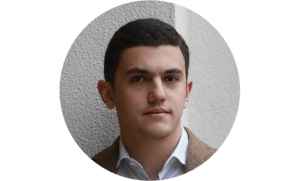Sebastião Bugalho
The title runs risks of appearing cynical or ironic but that is not what this is about. Marcelo Rebelo de Sousa, who has now been President of the Republic for almost six years, is perceived by those who see and hear him as the antithesis of a discrete head of state. His popularity, which he prefers to term his connection to the people, is the largest single factor responsible for this apparent effervescence. Marcelo on the beach, Marcelo by the river, Marcelo arriving at the site of a disaster before the firemen or the CMTV cameras, Marcelo giving flash-interviews at Portugal football matches, Marcelo phoning the Portuguese nurse that took care of Boris Johnson, Marcelo sending condolences over the death of George Michael, Marcelo talking to the country from his home via ‘webcam’, Marcelo announcing of his reapplication to the office of president, Marcelo being, not what he really is, but rather what the presidential figure has become for the Portuguese.
All of this is Marcelo – and none of this is Marcelo – because the paradoxes would always be inevitable for a politician who has been through two regimes, two Republics and other eras. The purpose of this text is not so much about what Marcelo is, indeed, the biographic task has already been undertaken, nor about what Marcelo has been to the extent that, courtesy of the media outlets that he also helped establish, this arrives directly into our homes. The point of this text is rather another exercise, which certainly occupies one corner of his own conscience: how will he go down in history after a decade in Belém? And this, looking at the political cycle that has now ended and to the one now emerging, it would seem to have little to do with the perception that we, as a country, have of the president through to the end of his presidency.
Marcelo was present, it is true to say, more than any of the others who performed this role prior to himself, in the declarations, appearances, government agreements and (already past) proximity to the prime minister. He got involved, was summoned to involvement and allowed himself to get involved in areas of the government, setting out paths, checking impulses and imposing boundaries.
However, this presence was no more than a reflection – on some occasions better managed than on others – of his ultimate priority as President of the Republic: stability. From his perspective, he who received a government composed of an unprecedented solution, a country still under corrective procedures due to excessive state deficits, an eroded party system undergoing metamorphosis, a populist threat emerging from his political field, the greatest humanitarian catastrophe experienced under democracy and largest health crisis in a century as well as the greatest financial room for manoeuvre since EU membership (the PRR and PT2030), his interventive style was more of a need than a preference.
When the ten years of Marcelo are up, we shall only feel the emptiness of some very difficult shoes to step into but also a swirl of so many difficult problems happening to coincide with the same period in time. The country in 2026 shall not certainly be a better place than it was in 2016 but one aspect is for sure: it will not be worse. And Marcelo, who was both popular and had mass popularity, who lent out his hand to the PS due to having nobody asking for the other, shall depart from the Palace of Belém as the most discreet of presidents. Without the temptations of a presidential regime of Eanes, with his government by presidential initiative and his own PRD; without the chicanery of Soares, who made life infernal both for Cavaco Silva and for Guterres; without the dissolution of parliament carried out by Sampaio; without the opposition of Cavaco to Sócrates in his second mandate or the attempted agreement between the then prime minister (Passos) and the leader of the opposition (Seguro); and without any of that which, inside or outside of his constitutional powers, would have enabled him to go down in history as somebody other than he himself.
Marcelo shall be, at the end, just Marcelo. The first president who did not want to be anything more than just that.







